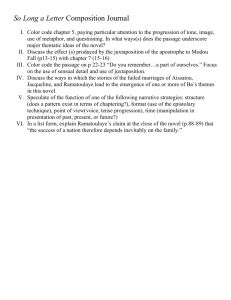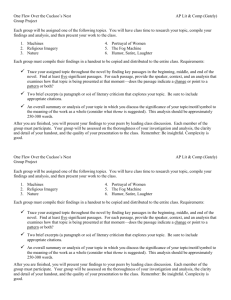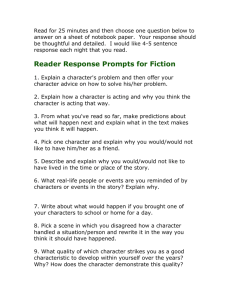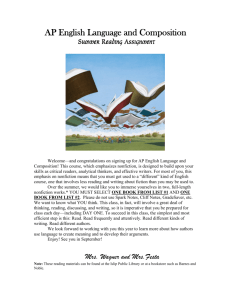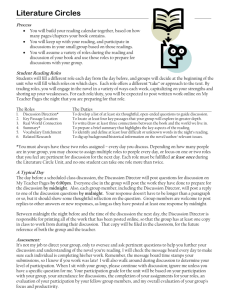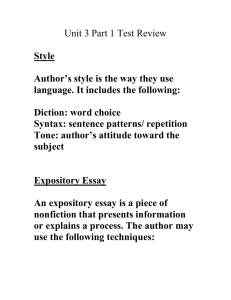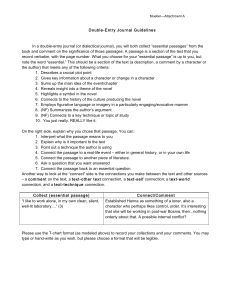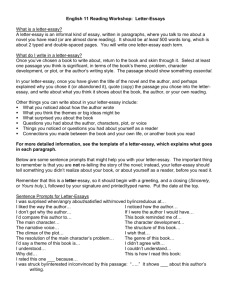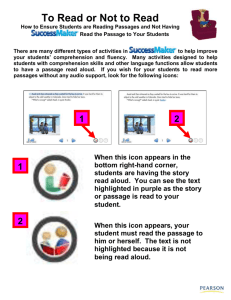TTTC quiz The Things They Carried essay test
advertisement
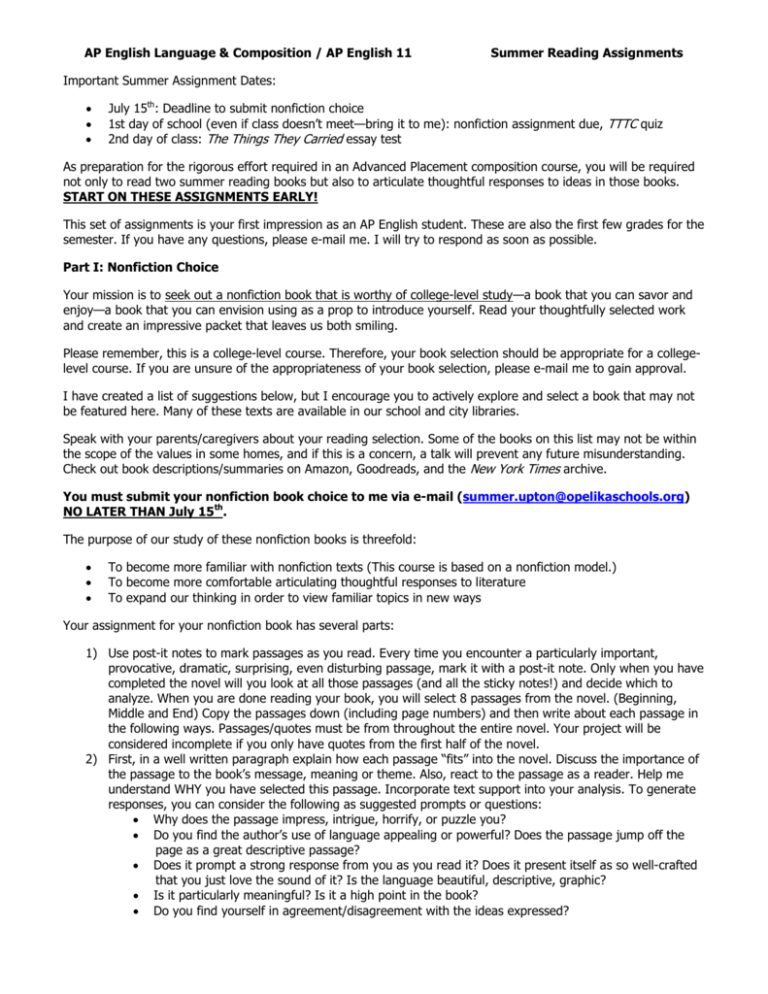
AP English Language & Composition / AP English 11 Summer Reading Assignments Important Summer Assignment Dates: • • • July 15th: Deadline to submit nonfiction choice 1st day of school (even if class doesn’t meet—bring it to me): nonfiction assignment due, TTTC quiz 2nd day of class: The Things They Carried essay test As preparation for the rigorous effort required in an Advanced Placement composition course, you will be required not only to read two summer reading books but also to articulate thoughtful responses to ideas in those books. START ON THESE ASSIGNMENTS EARLY! This set of assignments is your first impression as an AP English student. These are also the first few grades for the semester. If you have any questions, please e-mail me. I will try to respond as soon as possible. Part I: Nonfiction Choice Your mission is to seek out a nonfiction book that is worthy of college-level study—a book that you can savor and enjoy—a book that you can envision using as a prop to introduce yourself. Read your thoughtfully selected work and create an impressive packet that leaves us both smiling. Please remember, this is a college-level course. Therefore, your book selection should be appropriate for a collegelevel course. If you are unsure of the appropriateness of your book selection, please e-mail me to gain approval. I have created a list of suggestions below, but I encourage you to actively explore and select a book that may not be featured here. Many of these texts are available in our school and city libraries. Speak with your parents/caregivers about your reading selection. Some of the books on this list may not be within the scope of the values in some homes, and if this is a concern, a talk will prevent any future misunderstanding. Check out book descriptions/summaries on Amazon, Goodreads, and the New York Times archive. You must submit your nonfiction book choice to me via e-mail (summer.upton@opelikaschools.org) NO LATER THAN July 15th. The purpose of our study of these nonfiction books is threefold: • • • To become more familiar with nonfiction texts (This course is based on a nonfiction model.) To become more comfortable articulating thoughtful responses to literature To expand our thinking in order to view familiar topics in new ways Your assignment for your nonfiction book has several parts: 1) Use post-it notes to mark passages as you read. Every time you encounter a particularly important, provocative, dramatic, surprising, even disturbing passage, mark it with a post-it note. Only when you have completed the novel will you look at all those passages (and all the sticky notes!) and decide which to analyze. When you are done reading your book, you will select 8 passages from the novel. (Beginning, Middle and End) Copy the passages down (including page numbers) and then write about each passage in the following ways. Passages/quotes must be from throughout the entire novel. Your project will be considered incomplete if you only have quotes from the first half of the novel. 2) First, in a well written paragraph explain how each passage “fits” into the novel. Discuss the importance of the passage to the book’s message, meaning or theme. Also, react to the passage as a reader. Help me understand WHY you have selected this passage. Incorporate text support into your analysis. To generate responses, you can consider the following as suggested prompts or questions: • Why does the passage impress, intrigue, horrify, or puzzle you? • Do you find the author’s use of language appealing or powerful? Does the passage jump off the page as a great descriptive passage? • Does it prompt a strong response from you as you read it? Does it present itself as so well-crafted that you just love the sound of it? Is the language beautiful, descriptive, graphic? • Is it particularly meaningful? Is it a high point in the book? • Do you find yourself in agreement/disagreement with the ideas expressed? AP English Language & Composition / AP English 11 Summer Reading Assignments • Does the passage remind you of a situation you have lived as well? • Does the passage make you laugh out loud or make you melancholy or make you something else? • Does the author raise intriguing questions or issues? • Does the passage challenge or expand your thinking? You are not limited to the above list, nor do I expect you to answer all of the above. However, your responses to the passages should clearly explain to me WHY these passages mean something to you, WHY these passages caught your attention, and HOW these passages propel the author’s overall purpose of the novel. Also, be reasonably concise. Find a balance between quantity and quality in your writing. 3) Then, select ANOTHER passage (NOT one of the above 8) as “The Quote of the Book.” This should be that one passage that captures the essence – the true meaning – of the book for you, the reader. In a well written paragraph explain exactly HOW this passage is the one perfect quote from the book. Think of this as the one passage that you would absolutely want saved should your book ever be lost or destroyed. 4) Next, you need to write a REFLECTIVE LETTER (no more than one paragraph) about reading this book and creating your quotes paper. Write to me about the thoughts, feelings, observations, and new insights you experienced while reading it. Some ideas to think about for your letter: • Tell me what you worked on the hardest or struggled with in doing this assignment • Share with me what you think you did well: what worked, really worked • Show me where you were drawn into the novel and where you were pulled away from the novel. • Identify in your opinion the author’s – or the story’s – greatest strength and weakness • Discuss in what ways the novel is similar to your life • Explore what value, besides entertainment, this book has • Share your overall impressions of the novel • Discuss if you found yourself changing your mind about the book and/or the assignment • Tell me what you think you need to focus on for the next novel assignment • How this assignment helped sharpen your skills of literary analysis Your REFLECTIVE LETTER is your chance to “talk” with me about your book, your project, and your experiences in completing this assignment. With your letter, make me see your work – and your learning – through your eyes. 5) Finally, create a cover page to tie your assignment together. To help me assess your ability to effectively analyze a visual text, please include a cover page with a visual that you think captures some important aspect of your selected book. You can arrange the cover page as creatively as you want, but be sure to cite your source and include your name. In addition write a fully-developed paragraph of insightful analysis discussing the significance of this visual. The paragraph may be included on the cover page or on the page that follows. It is okay if this analysis ends up being a synthesis of information you’ve gleaned from any of the other sections. (For instance you may integrate one or more of you selected quotes/explanations.) You will be graded on the thoughtfulness of your responses, not necessarily length of writing or grammar and mechanics. I am grading to see that you are thinking about what you have read and connecting ideas to a larger context (your life, my life, the world as a whole, etc. – In other words, so what?). All passages must include the page number from which they are taken. Cite page numbers as (235) or (16) or (105). This assignment may be typed or handwritten. If typed, the assignment may be submitted electronically through e-mail. If handwritten, you may turn them in to me in person. Part II: The Things They Carried by Tim O’Brien The purpose of our study of this award-winning novel is twofold: • • To become more comfortable articulating thoughtful responses to literature To explore the importance of storytelling in our lives and issues of the human condition We will be using a reading guide to facilitate our reading of the book. The guide has questions as markers for your understanding of the reading but will not be turned in as an assignment. However, your graded assessment of the novel will consist of the following: • • Reading check quiz on the 1st day of class Essay test on the 2nd day of class (prompts provided on 1st class day) AP English Language and Composition Nonfiction Reading List GENERAL NONFICTION Title Power Plays: Politics, Football, and Other Blood Sports Quiet: The Power of Introverts in a World That Can’t Stop Talking Nickel and Dimed: On (Not) Getting By in America How Soccer Explains the World: An Unlikely Theory of Globalization Blink: The Power of Thinking Without Thinking Author John M. Barry Susan Cain Barbara Ehrenreich Franklin Foer Malcolm Gladwell Description An examination of the causes and effects of the pursuit of power in the arenas of the media, politics, and even college football. Award winning and NYT Bestselling author. Real-life examples that could change the way we see quiet members of our society One woman’s story of attempting to survive on minimum wage A surprising tour through the world of soccer, shining a spotlight on the clash of civilizations, the international economy, and just about everything in between. A book about how we think about thinking, about choices that seem to be made in an instant that aren’t as simple as they seem. A book about those men and women who are so accomplished and so extraordinary and so outside of ordinary experience that they are puzzling to the rest of us Explores the tipping point phenomenon—what causes a fashion trend, the popularity of a new product, or a drop in the crime rate A collection of essays that explore such nagging questions as “Why are there several varieties of mustard but only one of ketchup?” st Guide to seeing through 21 century media spin by the founders of FactCheck.org Outliers: The Story of Success Malcolm Gladwell The Tipping Point: How Little Things Can Make a Big Difference What the Dog Saw and Other Adventures Malcolm Gladwell unSpun: Finding Facts in a World of Disinformation Freakonomics: A Rogue Economist Explores the Hidden Side of Everything Superfreakonomics: Global Cooling, Patriotic Prostitutes, and Why Suicide Bombers Should Buy Life Insurance Lies My Teacher Told Me: Everything Your American History Textbook Got Wrong Amusing Ourselves to Death: Public Discourse in the Age of Show Business The Overachievers: The Secret Lives of Driven Kids Brooks Jackson and Kathleen Hall Jamieson Steven D. Levitt and Stephen J. Dubner Steven D. Levitt and Stephen J. Dubner Reefer Madness: Sex, Drugs, and Cheap Labor in the American Black Market A Hope in the Unseen: An American Odyssey from the Inner City to the Ivy League Eats Shoots and Leaves: The Zero-Tolerance Approach to Punctuation One L: The Turbulent True Story of a First Year at Harvard Law School The Beauty Myth: How Images of Beauty Are Used Against Women Eric Schlosser An exploration of how our current educational climate of high-stakes testing and pressure to achieve affects students An exploration of underground drug trade and its surprising parallels to big business Ron Suskind A young man’s journey from the slums of DC to Brown University Lynne Truss NOT a grammar handbook. An argument about how we communicate in our technologically-advanced world The author’s compelling experiences of being indoctrinated at America’s most prestigious law school A bestselling classic about the obsession with physical perfection Malcolm Gladwell James W. Loewen Neil Postman Alexandra Robbins Scott Turow Naomi Wolf An intriguing, easily readable exploration of data that answer questions like “Why do drug dealers live with their moms?” and “Do parents really matter?” A second volume in the Freakonomics series that asks new questions, such as “Are people hardwired for altruism or selfishness?” One history professor’s attempt to correct mistakes and misconceptions he found in several high school American history textbooks. Winner of American Book Award. An investigation of the television’s effect on American culture AP English Language and Composition Nonfiction Reading List ENVIRONMENTAL/HEALTH ISSUES Title Hot, Flat, and Crowded: Why We Need a Green Revolution—and How It Can Renew America Animal, Vegetable, Miracle In Defense of Food: An Eater’s Manifesto The Omnivore’s Dilemma: A Natural History of Four Meals Fast Food Nation: The Dark Side of the AllAmerican Meal The World Without Us HISTORICAL ACCOUNTS Title Rising Tide: The Great Mississippi Flood of 1927 and How It Changed America Author Thomas L. Friedman Barbara Kingsolver Michael Pollan Michael Pollan Eric Schlosser Alan Weisman Author John M. Barry Roger Williams and the Creation of the American Soul: Church, State, and the Birth of Liberty A Long Way Gone: Memoirs of a Boy Soldier Is Paris Burning: How Paris Miraculously Escaped Adolf Hitler’s Sentence of Death in August 1944 Columbine John M. Barry Ishmael Baeh Larry Collins and Dominique Lapierre Dave Cullen Man’s Search for Meaning Viktor E. Frankel Unbroken: A World War II Story of Survival, Resilience, and Redemption Profiles in Courage for Our Time Lauren Hillenbrand Into Thin Air: A Personal Account of the Mt. Everest Disaster The Devil in the White City: Murder, Magic, and Madness at the Fair that Changed America Jon Krakauer Caroline Kennedy Erik Larson Description Explores the decline of our planet because of global warming and overcrowding and offers solutions to the downward trend. Pulitzer Prize winning author. One family’s quest to “live off the land” in modern America A follow-up to The Omnivore’s Dilemma that conceives a conclusion to all the information from the previous book Recounts food’s journey from nature to our plates and how our choices affect our environment An exploration of the history of fast food, the impact it has had on our lives, and the myths we should forget about it A simple concept of imagining the Earth without human beings offers an intriguing way to explore our impact on the planet Description Account of flood of the MS River in 1927. Elements remarkably similar to the Katrina disaster. Students whose bent is engineering will find the fight of man vs. nature interesting. Connects well to American history, politics. Recipient of Francis Parkman Prize from Society of American Historians for year’s best American history book A history of the formation of American ideals that includes fundamental questions about the separation of church and state and individual freedoms One young man’s experience as a child soldier during wars in Africa’s Sierra Leone. Dramatic story of the liberation of Paris. Exciting, emotionally charged history, impeccably researched and written 10 years after the tragic events in Littleton, Colorado, asks questions about not only the shooters and victims but also the culture that surrounded such an incident. Psychiatrist’s memoir of life in Nazi death camps and its lessons for spiritual survival. Has sold more than 10 million copies in twenty-four languages. Listed in a Library of Congress survey as among top ten books that made a difference in people’s lives. The unforgettable tale of a young Army Air Forces bomber who crashed into the Pacific Ocean in 1943 Continues the legacy her father began with the original Profiles in Courage. Includes the accounts of thirteen acts of modern political bravery. A harrowing tale of the perils of high-altitude climbing, a story of bad luck and worse bbjudgment and heart-breaking heroism Borders on true crime. The story of two men important to the Chicago World’s Fair of 1893, one the architect responsible for the fair’s construction and the other a serial killer masquerading as a young doctor. AP English Language and Composition Nonfiction Reading List In the Garden of Beasts: Love, Terror, and an American Family in Hitler’s Berlin Reading Lolita in Tehran The Professor and the Madman: A Tale of Murder, Insanity, and the Making of the Oxford English Dictionary Erik Larson Azar Nafisi Simon Winchester Account of the first U.S. ambassador to Hitler’s Germany from 1933 and his family watching history unfold from the other side One bold teacher who shares forbidden Western literature with seven Iranian women The interesting account of a giant undertaking and the two men most responsible for it SCIENCE / MEDICINE (Especially appealing for students who are science oriented or interested in the medical field) Title Author Description The Great Influenza: The Story of the Deadliest John M. Barry A detailed description of the scourge of the "Spanish flu" of 1918 with interesting Pandemic in History elements of the practice of medicine and medical school in those days. Winner of several awards. Surgeon!: A Year in the Life of an Inner-City Doctor Dr. Richard Caleel A must read for anyone interested in the medical profession The Emperor of All Maladies Siddhartha Mukherjee The “biography” of cancer and its treatment for over a thousand years Gulp: Adventures on the Alimentary Canal Mary Roach A riveting look at our insides that explores such questions as “How much can I eat before my stomach bursts?” and “Did constipation kill Elvis?” Spook: Science Tackles the Afterlife Mary Roach A scientific examination of what happens after we die Stiff: The Curious Lives of Human Cadavers Mary Roach About all the good deeds bodies that are donated to science do for us The Man Who Mistook His Wife for a Hat and Oliver Sacks Recounts the case histories of patients lost in the bizarre, apparently inescapable Other Clinical Tales world of neurological disorders The Immortal Life of Henrietta Lacks Rebecca Skloot The story of a poor Southern tobacco farmer’s wife whose cells—taken without her knowledge—became the first “immortal cells” in history. They are still alive today and have been used in numerous experiments since her death over 60 years ago. TRUE CRIME Title Helter Skelter: The True Story of the Manson Murders In Cold Blood Author Vincent Bugliosi Our Guys: The Glen Ridge Rae and the Secret Life of the Perfect Suburb Bernard Lefkowitz A Death in Texas: A Story of Race, Murder, and a Small Town’s Struggle for Redemption Dina Temple-Raston Truman Capote Description Written by the lead prosecuting attorney, this book recounts the horrific crimes committed by Charles Manson and four of his followers The first nonfiction novel. Reconstructs the 1959 murder of a Kansas farm family and the investigation that led to the capture, trial, and execution of the killers, the story of the lives and deaths of these six people, the victims and the murderers. Account of 1989 rape of a mentally retarded girl by members of a NJ high school football team. Several parallels to like crimes in recent years, including those in Steubenville, Ohio. Explores the aftermath of the 1998 killing of James Byrd, Jr., a black man who was chained and dragged along a country road by three white males.

